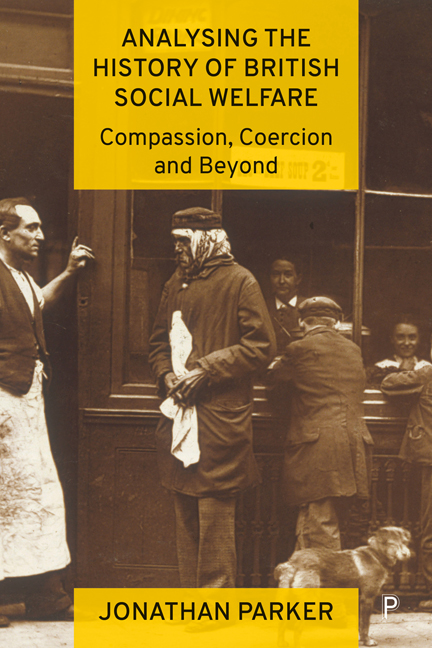Book contents
- Frontmatter
- Contents
- List of tables
- List of abbreviations
- About the author
- Acknowledgements
- 1 Concepts, continuities and critique
- 2 A brief history of British social welfare
- 3 Philosophical binaries and normative judgements
- 4 Chocolate, flowers and social welfare reform
- 5 War: the paradoxical crucible of welfare reform
- 6 Gendered perspectives on welfare
- 7 Piacular austerity: sacrificing the poor for the rich
- 8 Universal Credit versus Universal Basic Income: strange bedfellows?
- 9 Universal Credit versus Universal Basic Income: strange bedfellows?
- 10 W(h)ither welfare after Brexit and COVID-19?
- References
- Index
7 - Piacular austerity: sacrificing the poor for the rich
Published online by Cambridge University Press: 20 January 2024
- Frontmatter
- Contents
- List of tables
- List of abbreviations
- About the author
- Acknowledgements
- 1 Concepts, continuities and critique
- 2 A brief history of British social welfare
- 3 Philosophical binaries and normative judgements
- 4 Chocolate, flowers and social welfare reform
- 5 War: the paradoxical crucible of welfare reform
- 6 Gendered perspectives on welfare
- 7 Piacular austerity: sacrificing the poor for the rich
- 8 Universal Credit versus Universal Basic Income: strange bedfellows?
- 9 Universal Credit versus Universal Basic Income: strange bedfellows?
- 10 W(h)ither welfare after Brexit and COVID-19?
- References
- Index
Summary
The notion of sacrifice is often used to justify immediate hardships in the hope of longer-term gain. However, it is usually those who are least affected by these ‘sacrifices’ that impose them on or require them of others. Such claims are made from positions of power in which assertions that ‘we are all in it together’ misdirect listeners from differences in experience, capital and resource. The concept of sacrifice is deeply rooted in the social consciousness, stemming from religious contentions of expiating wrong, and from struggle as a personal quality. It is often seen as necessary to achievement and is easily used, therefore, by those with political power to develop and implement policies and practices that enhance that power at the expense of those who are ‘sacrificing’ or being ‘sacrificed’.
This chapter addresses the socio-political rationale for austerity measures and analyses this in terms of power relations and the social ritual sacrifice of the poor. Durkheim's concept of ‘piacularism’ as a collective social rite of mourning and Girard's subsequent concept of mimetic violence and the scapegoat are introduced as relevant conceptual metaphors for some of the ways in which social policies are enacted and supported to preserve a particular normative understanding of social life by sacrificing those considered poor, vulnerable and marginalised and loading them with social ‘sin’ that requires punishment and, in contemporary society, demands and legitimises the stigmatisation and punishment of those in poverty because they embody that social ‘sin’ (Katz, 2013). The use of these understandings is suggestive of violence (Ray, 2018). This is, indeed, useful as it brings home the everyday reality of many people sacrificed for the sake of established order, money and power. British society, just as others across the world, is not static and internal and external changes create novel demands which require changing the ways in which sacrifice takes place. The morally feckless and undeserving also shift according to the contemporary definition of the hate figure on the receiving end of such opprobrium. While the chapter focuses on austerity measures adopted in response to the 2008 financial crisis this does not imply that such measures are new or, indeed, that political decisions to sacrifice the poor and vulnerable have not been taken before and earlier examples will also be used.
- Type
- Chapter
- Information
- Analysing the History of British Social WelfareCompassion, Coercion and Beyond, pp. 118 - 134Publisher: Bristol University PressPrint publication year: 2023



